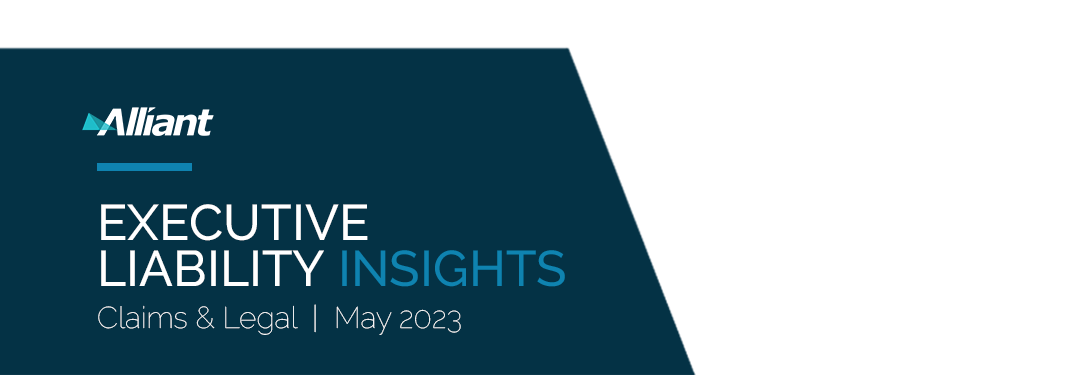
Navigating today’s complex risk environment can be a monumental task. Steve Shappell, Alliant Claims & Legal, spearheads Executive Liability Insights, a monthly review of news, legal developments and information on executive liability, cyber risk, employment practices liability, class action trends and more.


FEATURED ARTICLE
THE INTERPLAY OF RESCISSION AND SEVERABILITY
Clear Blue Specialty Ins. Co. v. Ozy Media, Inc., No. 5:21-cv-08764-EJD, 2023 U.S. Dist. LEXIS 69611 (N.D. Cal. Apr. 20, 2023).
Professionals are trained not to engage in conduct that would lend them to appearing on the front page of the New York Times. Sadly, in the realm of insurance, policyholders do not always disclose information about such conduct and risk factors on their insurance applications.
THE INTERPLAY OF RESCISSION AND SEVERABILITY
Clear Blue Specialty Ins. Co. v. Ozy Media, Inc., No. 5:21-cv-08764-EJD, 2023 U.S. Dist. LEXIS 69611 (N.D. Cal. Apr. 20, 2023).


Professionals are trained not to engage in conduct that would lend them to appearing on the front page of the New York Times. Sadly, in the realm of insurance, policyholders do not always disclose information about such conduct and risk factors on their insurance applications. So, when major newspaper publications shed light on such omissions, the rescission of coverage follows.
In pursuit of financial investments from one of the largest investment banks, a small media company (the “Company”) impersonated an executive of a large global online video-sharing platform (the “Platform”). The imposter, predictably, provided the investment banker with flattering feedback on the Company’s success and leadership on the Platform. The investment bank discovered the lie and refused to invest in the Company. Later, a daily newspaper published an article about the impersonation incident and the Insurer sent the “Notice of Cancellation of the Policy” to the Company’s insurance brokers. Nevertheless, the Company found investors who were willing to invest in their Company but failed to disclose the impersonation incident to these investors. As a result, the Company received subpoenas from the SEC and federal grand jury, so the Company notified the Insurer of the subpoenas and sought coverage under the policy. The Insurer asked the court to rescind the policy on the grounds of material misrepresentations contained in the Company’s insurance application.
The Policy stated that “the Insured represent[ed] and acknowledge[d] that the statements and information contained in the Application [were] true, accurate, and complete . . .” and that the Insurer had the right to rescind the policy if “the Application contains misrepresentations or omissions that materially affect the acceptance of the risk, or the hazard assumed by [the insurer].” In case of rescission, “[the] [p]olicy shall be void ab initio and shall not afford coverage for any Insured who knew on the inception date of this Policy the facts that were not truthfully disclosed in the Application . . ..”
The Insurer successfully argued that the policy should be rescinded as to the Company’s former COO, who pled guilty to various criminal fraud charges against him. Because it was likely that at the time of the application, the former COO knew of the alleged misrepresentations the court agreed that the policy should be rescinded against him. The court applied the same conclusion to the entity itself. Yet, because the policy’s severability provision provided that it was possible for the policy to be rescinded against some Insureds, but not others, the Company’s CEO was entitled to coverage under the policy, since, at the time of this proceeding, there was little evidence supporting that he concealed material information from the Insurer.
The Takeaway
Reviewing the insurance applications with qualified brokers remains crucial, especially when insureds find themselves in doubt as to whether something needs to be disclosed. Yet, it is even more crucial to review the severability language of insurance policies to have the comfort that innocent policyholders would not be punished for the alleged misconduct of other insureds, even if a given policy is rescinded.
CHANGE OF CONTROL PROVISION SERVES TO EXCLUDE COVERAGE FOR SPAC
Amtrust Int'l Underwriters DAC v. 180 Life Scis. Corp., No. 22-cv-03844-BLF, 2023 U.S. Dist. LEXIS 70144 (N.D. Cal. Apr. 21, 2023).
This matter concerns a denial of coverage based on the Change of Control Exclusion within the Directors and Officers policy of a SPAC Company. Allegations were made against the former company and its officers for providing false financial statements and engaging in other unauthorized acts that caused the go-forward company significant damages.


The SPAC company (“SPAC”) was created to acquire certain businesses and purchased D&O coverage and run-off coverage. The SPAC then merged with its target company, adopted the target company’s name (“New SPAC”), and proceeded to acquire several other companies thereby forming a new wholly-owned subsidiary (“Merger Sub”). Merger Sub was absorbed by one of the other companies and was renamed (“New Subsidiary Company”), ultimately ceasing to exist. Only New SPAC (parent company) and New Subsidiary Company remained. Later, the directors and officers of the New SPAC resigned.
The SEC commenced an investigation into the merger and issued subpoenas to the resigned New SPAC directors and officers. The directors and officers sought expenses from New SPAC and New SPAC sought coverage under the policies obtained by SPAC. The carriers denied coverage, and coverage litigation initiated by the company followed.
Carriers asserted and the court agreed that the Change of Control Exclusion applied to this matter to preclude coverage. The Exclusion stated: “if during the Policy Period: (1) the Named Insured shall consolidate with or merge into any other entity or group of persons or entities acting in concert, or (2) any person or entity or group of persons or entities acting in concert shall acquire Management Control of the Named Insured,… then this policy may not be cancelled thereafter and it shall not apply to any Claim alleging in whole or in part any Wrongful Acts committed, attempted, or allegedly committed or attempted by any Insured subsequent the date of such Change In Control.”
The court found it undisputed that there was a change of control once the merger was concluded, and the entire board resigned. Rejecting the argument for coverage that the subpoenas sought both pre- and post-merger documents and found that the Change of Control Exclusion could still apply. Further, the fact of this matter being brought by New SPAC for individual directors and officers who resigned supports the application of the Change of Control Exclusion.
FORMER OFFICER NOT ENTITLED TO COVERAGE FOR BREACH OF FIDUCIARY DUTY CLAIM; CARRIERS RELY ON INSURED V. INSURED AND PRIOR ACTS/PRIOR KNOWLEDGE EXCLUSIONS:
Bigelow v. Great Am. Ins. Co., No. 22-cv-00545-DKW-KJM, 2023 U.S. Dist. LEXIS 70093 (D. Haw. Apr. 20, 2023).
In the underlying action, a Company sued one of its former officers for violations of trade secrets, non-compete agreements, and for breach of fiduciary duty. The Insured Person tendered a Claim to the D&O insurance carriers (the “Carriers”) with his former employer as well as for his current employer.


The case was eventually settled but both insurance carriers denied coverage for defense costs and indemnity. The first carrier cited the Insured v. Insured exclusion as the basis for a full denial and the second carrier cited the Prior Wrongful Acts/Prior Knowledge exclusion. Coverage litigation ensued.
The court found in favor of the Carriers and determined the Insured Person was not entitled to coverage under either policy. With respect to the Insured v. Insured exclusion, the court was not swayed by the Insured’s argument that the breach of fiduciary duty claim was actually a Claim brought by or on behalf of shareholders and therefore did not fit within the language of the Insured v. Insured exclusion. Instead, the court found that it “is undisputed [the Company] and the [Insured] were co-insureds under the . . . policy and the underlying action is a lawsuit” brought by one Insured against another Insured.
With respect to the Prior Acts/Prior Knowledge exclusion, the Insured Person appeared unable to mount much of a challenge but did proffer that notice under the current employer’s policy was made timely and that the Claim was first made during the applicable Policy Period. The court seemingly had no choice but to side with the Carrier and found that “nearly all of the acts set forth in the underlying complaint’s more than 365 paragraphs detail wrongful conduct prior to” when the Insured Person discontinued employment with the former employer.
The Takeaway
Reviewing the insurance applications with qualified brokers remains crucial, especially when the insureds find themselves in doubt as to whether something needs to be disclosed. Yet, it is even more crucial to review the severability language of insurance policies to have the comfort that innocent policyholders would not be punished for the alleged misconduct of other insureds, even if a given policy is rescinded.
FOURTH CIRCUIT HOLDS THAT BUMP-UP EXCLUSION BARS COVERAGE UNDER D&O POLICY FOLLOWING A MERGER
Towers Watson & Co. v. Nat’l Union Fire Ins. Co., 2023 U.S. App. LEXIS 11338 (4th Cir. 2023)


This coverage dispute arose out of a shareholder lawsuit against the Insured’s chairman and CEO as well as others, alleging that the shareholders received below-market consideration for their shares in a merger. The litigation settled, and the Insured sought indemnity coverage from its Directors and Officers insurance carrier (the “Carrier”). The Carrier refused the indemnity request, citing a so-called "bump-up" exclusion in the policy. The district court held that the bump-up exclusion "does not unambiguously" preclude indemnity coverage for the underlying settlement. However, on appeal, the 4th Circuit reversed, finding the court had adopted an unduly narrow reading of the exclusion, finding ambiguity where none exists and ascribing specialized meanings to policy terms that the parties did not reasonably intend. The exclusionary language stated:
In the event of a Claim alleging that the price or consideration paid or proposed to be paid for the acquisition or completion of the acquisition of all or substantially all the ownership interest in or assets of an entity is inadequate, Loss with respect to such Claim shall not include any amount of any judgment or settlement representing the amount by which such price or consideration is effectively increased.
The Insured argued that the Merger Agreement did not result in "the acquisition of all or substantially all the ownership interest" as required under the bump-up exclusion because the transaction involved a merger of equals, not an acquisition, noting that under the Merger Agreement, the surviving entity-subsidiary merged into the Insured, with the Insured being the entity surviving in that transaction. Following the merger, the Insured’s shares were immediately canceled, and delisted, and the newly created shares were issued solely to the surviving entity. These events collectively resulted in the Insured, with all its pre-merger assets, becoming a wholly owned subsidiary of the surviving entity.
The 4th Circuit disagreed with the lower court noting that nothing in the bump-up exclusion indicated the term “acquisition” was limited to a particular form of acquisition. The 4th Circuit stated the “general principle that exclusions must be narrowly construed assuredly does not authorize us to take such a drastic step. Far from it. Courts are not at liberty to rewrite otherwise plain and unambiguous policy language in order to arrive at an insured-favorable outcome.” Here, the court found the bump-up exclusion referred to "the acquisition of all or substantially all the ownership interest in or assets of an entity," and reasoned that the term "acquisition" must be given its ordinary meaning, which is to gain "possession" or "control" of something. Thus the 4th Circuit concluded, the bump-up exclusion's "acquisition" requirement is satisfied where another entity secures "possession" or "control" "of all or substantially all the ownership interest in or assets of" an entity which was precisely what happened here.
DELAWARE CHANCERY GRANTS PLAINTIFF PARTIAL WIN, HOLDING THAT PRIOR NOTICE EXCLUSION DOES NOT APPLY TO PRECLUDE COVERAGE
Nat’l Amusements, Inc. v. Endurance Am. Specialty Ins. Co., No. N22C-06-018 AML CCLD, 2023 Del. Super. LEXIS 211 (Super. Ct. Apr. 28, 2023)


A recent ruling by the Delaware Chancery Court offered a partial victory to insureds who were seeking coverage under their Directors and Officers (“D&O”) insurance for a shareholder settlement pertaining to allegations of insufficient share price proceeds related to a merger between a media company and a television company. The D&O policies were “claims-made” policies, requiring that the claims needed to be made during the policy period, including claims for “wrongful acts.”
The carriers contended that coverage was precluded due to several exclusions, including one for Prior Notice. Citing to that exclusion, the carriers argued that there was an earlier “substantially similar” suit filed prior to the policy inception. In making the Prior Exclusion argument, the carriers argued that this matter involved interrelated wrongful acts requiring that only the earlier policies were triggered. The court found that the Prior Notice Exclusion did not apply because the requirement that notice to the prior D&O tower must have been given prior to the policies’ inception date was not met.
However, the court found that there were questions as to whether the two lawsuits involved interrelated wrongful acts surrounding decisions made by the insured’s board as the original lawsuit was filed under seal and certain facts were simply “not available.” Interestingly, the court suggested that the suits did not seem interrelated and even expressed concern about the availability of coverage: “if any board decision is interrelated with the prior actions, the policyholders effectively have no [D&O] coverage at all, despite paying annual premiums for that coverage.”
PREJUDICE IS REQUIRED FOR AN INSURER TO DENY COVERAGE FOR TARDY NOTICE UNDER A CLAIMS-MADE POLICY
Triyar Hosp. Mgmt., LLC v. Qbe Specialty Ins. Co., No. 2:21-cv-04474-SSS-SKx, 2023 U.S. Dist. LEXIS 38883 (C.D. Cal. Jan. 17, 2023).
A California district court held that an insurer must show prejudice to deny coverage for late notice under a claims-made (distinguishable from a “claims made and reported”) policy. The matter stems from a hospitality company, (the “Insured”), that unsuccessfully sued another party to seek enforcement of a property purchase agreement.


As a result of losing in that lawsuit, the court entered an order against the Insured and ordered it to pay the prevailing party for its attorney’s fees and costs. Two separate court orders (the "Judgments") were entered against both the Insured entity and its officers with regard to these payments.
The Insured first provided notice of the Judgments to its insurance carrier, under a policy of insurance that had expired years prior. The policy’s terms and conditions provided that "[n]otice of any Claim . . . is considered timely when reported to the Insurer as soon as practicable after the Parent Company's chief executive officer or chief financial officer first becomes aware of such Claim." However, the "Insurer shall not assert that notice of a Claim was untimely unless the Insurer is materially prejudiced by the untimely notice. However, in no event shall any notice be provided later than . . . 60 days after the [date of] expiration or termination" of the "applicable Liability Coverage Part."
The primary dispute before the court concerned (1) whether both Judgments constitute "Claims" within the Policy's definition; (2) whether the Judgments, if they are indeed "Claims," were timely reported to the carrier; and (3) if the Judgments were not timely reported, whether the carrier may assert untimeliness as the basis for refusing coverage to Plaintiffs.
The court found that both Judgments were claims (as they constituted written demands for monetary relief) but that they were not timely reported. It further concluded that California's "notice-prejudice" rule applied to the policy such that the carrier must demonstrate that it was prejudiced by the late notice to be able to deny coverage for that reason. The court decided it was for the jury to make the determination on the question of prejudice and denied the parties’ motions for summary judgment on these issues.
The Takeaway
Importantly, the court distinguished between claims made and reported policies versus just claims made policies. Claims made-and-reported policies provide coverage only for those claims made against the insured and reported to the insurer within the policy period. General claims-made policies do not contain such a reporting requirement. The policy at issue in this case was a “claims made” policy, and not (despite the carrier’s argument to the contrary) a claims-made and reported policy. The California notice-prejudice rule (that the court relied upon here) would only apply to a general “claims-made” policy.
FAILURE TO DISCLOSE PRIOR ACTS? COVERAGE PRECLUDED BY APPLICATION EXCLUSION!
SHH Holdings, LLC v. Allied World Specialty Ins. Co., 2023 U.S. App. LEXIS 9570, 2023 FED App. 0082P (6th Cir.) (Apr. 21, 2023).
The Sixth Circuit overturned a lower court’s decision involving a coverage dispute related to the Application Exclusion. In doing so, the court held that the underlying action against the company barred coverage for the corresponding retaliation claims.


The facts of the underlying action date back to when employees of the Insured alleged that they were retaliated against for an internal complaint, related to the Insured’s unreasonable and unnecessary services that were billed to the client’s medial insurance carriers. That suit was filed under seal. The U.S. Department of Justice (“DOJ”) issued an investigative demand against the Insured. Yet, the Insured still had no knowledge of the sealed retaliation and False Claims Act complaint. Within that time, the Insured applied for Insurance and filled out the form that inquired about the Insured’s prior conduct. The form explained any relevant information falling within the purview of its questions would be excluded from coverage. In response to the questions contained in the form, the Insured responded, “No,” and the Carrier issued the policy. The Insured did not disclose the information regarding the DOJ investigation. Two years later, the suit was unsealed, and the Insured learned of the retaliation allegations.
The Insured turned to the insurance carrier (the “Carrier”) for coverage for the unsealed lawsuit, and the Carrier denied coverage under the Directors and Officers and Employment Practices coverage lines, citing the Application Exclusion. The exclusion stated, “that if any information, investigation, or lawsuit exists at the time of the application [about a given matter] . . . that matter is excluded from coverage.” Troubled by the denial, the Insured sued the Carrier in federal court alleging breach of contract. The question before the court was whether the questions in the application encompassed any inquiry or investigation for which the Insured was seeking coverage.
The Insured contended that the application questions were ambiguous, and they were unaware of any wrongdoing that could potentially lead to a claim for which coverage would be sought. However, the Carrier, argued that the Application Exclusion clause unambiguously covered the DOJ demand, and the district court erred by misinterpreting the plain language of the Application Exclusion. Also, the Sixth Circuit held that the lower court should not have relied on hypothetical examples at the expense of the facts of the underlying case in reaching an Insured-favoring holding. The court overturned that holding and agreed with the Carrier, pointing to the rule of textual interpretation “that a qualifying word or phrase should be read to modify only the noun or phrase that it immediately follows.” When analyzing the language of the application which states that the Insured must “provide full details of all inquiries, investigations . . . filed within the last three (3) years against [the Insured], any Subsidiary, any Executive, or other entity proposed for any coverage for which [the Insured] is applying, the court explained that “proposed for any coverage” modified the phrase immediately preceding it—“any Subsidiary, any Executive or other entity.” Thus, the most natural reading “prosed for any coverage” modified “inquiries, investigations, administrative charges, and lawsuits.” As a result, the court determined that the Application Exclusion precluded coverage for any matter related to the underlying action.
PUBLIC POLICY DOES NOT PRECLUDE COVERAGE FOR ANTI-KICKBACK AND FALSE CLAIMS VIOLATIONS
Astellas US Holding, Inc. v. Fed. Ins. Co., No. 21-3075, 2023 U.S. App. LEXIS 10883 (7th Cir. May 3, 2023).
An Illinois Federal Appellate Court found in favor of a pharmaceutical company, (“the Insured”) in a coverage dispute relative to Anti-Kickback and False Claims violations stemming from “patient assistance plans” implemented by the Insured. The DOJ began investigating the company and its executives relative to significant contributions to certain funds that were part of the patient assistance plans, resulting in an ultimate settlement of $100 million.


After the settlement, the Insured sought recovery of the $10 million policy limit from one of its Directors & Officers insurance carriers. The carrier denied coverage under the policy, arguing that the settlement was uninsurable because it functioned as a restitution for deliberate fraud.
On appeal, the court first looked to the “final adjudication” exclusion. Yet, when the matter had settled, the court found the exclusion inapplicable because there had been no final adjudication of the matter. Since the intent of the exclusionary language excluded only deliberate fraud or willful misconduct after final adjudication, the court determined that the carrier “was willing to extend coverage, if permissible, to settlements even for claims for deliberate fraud and willful violations of the law, so long as there was no final adjudication.”
The court next looked at whether public policy would exclude such payments, and also distinguished between the insurability of compensatory versus restitutionary payments. The carrier argued that the Insured’s settlement payments with the government were restitutionary in nature, and therefore uninsurable. The court undertook a lengthy analysis to determine which category this settlement fell into. Part of the analysis addressed whether the carrier could show that the settlement payment was "not even potentially covered.” Since the matter had settled prior to final adjudication, the court was required to review the known facts to determine if there was enough evidence to suggest that the Insured would have reasonably been found liable for fraud. As the Insured had sought the advice of counsel prior to contributing to the patient assistance plans and demonstrated a good faith effort to comply with Federal guidance under the program, it may have been difficult for the DOJ to prove fraud against the insured had the matter been litigated. As contractually agreed to in the insurance policy, the parties delegated assessment of possible "illegal remuneration," "deliberate fraudulent act[s]," or "willful violation[s] of law" to a third-party adjudicator in an action brought by a third party.
Despite $50 million of the settlement being labeled as “restitutionary,” the court disagreed that was sufficient to show that the settlement was uninsurable as a matter of public policy. The False Claims Act does not provide for restitutionary damages, and the carrier could not offer sufficient evidence to find either fraud or disgorgement of profits in the settlement.
The court ultimately determined that the undisputed facts show that the settlement payment here was not restitutionary, and insurance coverage was available for the settlement.
Cyber Corner
CYBER SPRING: MARKET FOR CYBER INSURANCE SHOWS SIGNS OF STABILIZING
Fitch Ratings announced that underwriters are anticipating favorable premium growth and underwriting results through 2023, and they expect that pricing increases will continue to moderate, thanks to several positive developments in the market.
NOT PETYA? NOT SO FAST. APPELLATE COURT SIDES WITH INSURED ON WAR EXCLUSION
Merck & Co. v. Ace Am. Ins. Co., Nos. A-1879-21, A-1882-21, 2023 N.J. Super. LEXIS 43 (Super. Ct. App. Div. May 1, 2023).
A state appellate court has affirmed a lower court’s ruling that an exclusion for “hostile or warlike actions” under a pharmaceutical company’s Property policy did not apply to the 2017 malware attack known as “NotPetya.”
SEC Corner
SUPREME COURT CHALLENGES THE SEC IN-HOUSE PROCEEDINGS
The U.S. Supreme Court’s recent decision sheds light on a pathway to challenge the constitutionality of the SEC’s in-house proceedings. In a unanimous decision, the Court concluded that a public accountant could continue to pursue their constitutional challenges against the SEC in federal court, even if such an accountant has not gone through the traditional appeal process mandated by Congress.
ACCOUNTING CLASS ACTION FILING AND SETTLEMENTS
In the 2022 fiscal year, there was a slight increase in the number of securities class action filings involving accounting allegations. The median filing lag also increased to 24 days, which was the longest in the past decade.
APRIL 2023 NOTEWORTHY ENFORCEMENT ACTIONS FILED
|
Director/Officer |
Role |
Company |
|
Michael J. French |
Owner |
MJF Holdings, LLC / MJF Capital, LLC |
|
William Eric Meek |
COO |
Celadon Group, Inc. |
|
William B. North |
CCO |
Wilmington Trust |
|
William Shihara |
CEO |
Bittrex, Inc. |
| Jeffrey Hastings | CEO | SAExploration Holdings, Inc. |
|
Director/Officer |
Role |
Company |
|
Michael J. French |
Owner |
MJF Holdings, LLC / MJF Capital, LLC |
|
William Eric Meek |
COO |
Celadon Group, Inc. |
|
William B. North |
CCO |
Wilmington Trust |
|
William Shihara |
CEO |
Bittrex, Inc. |
|
Jeffrey Hastings |
CEO |
SAExploration Holdings, Inc. |
APRIL 2023 NOTEWORTHY SETTLEMENTS AND JUDGMENTS
|
Amount |
Director/Officer |
Role |
Company |
|
$ 1,311,822.79 |
Jeffrey Hastings |
CEO |
SAExploration Holdings, Inc. |
|
Amount |
Director/Officer |
Role |
Company |
|
$1,311,822.79 |
Jeffrey Hastings |
CEO |
SAExploration Holdings, Inc. |
Source: U.S. Securities and Exchange Commission
Financial
Source: Stanford Law School Securities Class Action Clearinghouse
ABOUT ALLIANT INSURANCE SERVICES
Alliant Insurance Services is the nation’s leading specialty broker. In the face of increasing complexity, our approach is simple: hire the best people and invest extensively in the industries and clients we serve. We operate through national platforms to all specialties. We draw upon our resources from across the country, regardless of where the resource is located.
Contributors


Abbe Darr, Esq.
Claims Attorney
abbe.darr@alliant.com
David Finz, Esq.
Claims Attorney
david.finz@alliant.com
Isabel Arustamyan
Claims Advocate
isabel.arustamyan@alliant.com
Jacqueline Vinar, Esq.
Claims Attorney
jacqueline.vinar@alliant.com
Jaimi Berliner, Esq.
Claims Attorney
jaimi.berliner@alliant.com
Malia Shappell, Esq.
Claims Attorney
malia.shappell@alliant.com
Michael Radak, Esq.
Claims Attorney
michael.radak@alliant.com
Robert Aratingi
Senior Claims Advocate
robert.aratingi@alliant.com
Robert Hershkowitz, Esq.
Claims Attorney
robert.hershkowitz@alliant.com
Steve Levine, Esq.
Claims Attorney
slevine@alliant.com